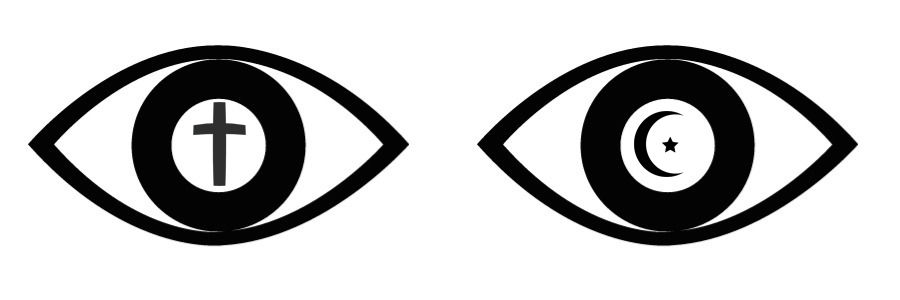Woods: Morality through religious eyes
Richard Martinez/Iowa State Daily
We all see the world in different ways. While Columnists Woods’ view is largely formed through Christianity, the lessons can be applied to people of any faith or of no faith at all.
January 30, 2015
The basis by which we live has been founded on religious belief. Before man created law, man lived by law created by God. Laws against the actions of murder, lying, stealing, originated with God as His commandments to His people. They are the simple rules of life that humans grow up to learn and follow.
Such concepts transcend into various other religions. For Hindus, there is the belief that all life is sacred, to be loved and revered, and so non-injury in thought word and action is to be practiced. In Buddhism, Sila is observed. Buddhists believe in the principle that all things are equal and practice the discipline of reciprocity or the Golden Rule.
Even fundamentalist or extremist Muslims are expected to live by a law as according to Sharia, or “God’s Way,” stealing, lying, committing adultery, and gambling are prohibited.
Some radicals elect not to adhere to those rules and do so with a multitude of reasonings, religious justification being one. The attack at Charlie Hebdo is one of many incidents in history that wield the banner of a God claiming to do its work. As a result of what our society has defined to be moral, we have deemed those actions purely wrong.
Yet, who are we to confront and discredit the beliefs of others? How can we label our convictions superior above those around us? We can’t. What we can do, as humans, is believe whatever we want to and in whatever we want to. We can live by our own morals, motivated by a religious nature or whatever you will.
As for me, I will believe that because of my religion, how I have learned and grown in my own faith, the actions taken place in Paris were unjust. Through the understanding of the Bible, how mankind should behave is revealed. It then becomes possible to grasp the idea; there is no reason for violence. When God provided for the world the ultimate sacrifice, his only son for the sins of humanity, how we should live is explained in two resounding concepts:
“You shall love the Lord your God with all your heart, with all your soul, and with all your mind. This is the first and great commandment. And the second is like it: You shall love your neighbor as yourself. On these two commandments hang all the Law and the Prophets.” (Matthew 22:37-40)
For those who choose to believe, who choose to have faith in God and his teachings can understand that through Jesus Christ our sins are forgiven. Through Jesus, humanity is under grace and no longer under a law created for a people without any hope of escaping sin. These commandments encapsulate the way mankind should live day to day. Through these commandments, I proclaim the actions in Paris morally and religiously unjust.
As a Christian, I am urged to treat others as I would wish to be treated, or the Golden Rule. Anyone of any walk of faith, or lack there of, would be able to make sense of the notion that life is valuable; therefore life should be protected and not annihilated, harmed. And so, humanity should not be violent in any nature. Nor, if any form of violence is committed, should we take vengeance or religious righteousness upon that action done. We are to turn the other cheek. For those who disagree with this perception, ask yourself, do two wrongs make one right?
To convene the words of Alexander Pope, “to err is human, to forgive, divine.”
Our counter to violence of any character is forgiveness. We are imperfect as humans; therefore fault is in our nature. It is to be above our human nature and forgive. Humanity must pardon wrongdoings instead of acting on them violently. Through forgiveness we may find peace. Humanity is called to forgive even when forgiveness is most distant from our thoughts. Thus, resolutions may present themselves and strong relationships may be made.
“Then Peter came to Him and said, ‘Lord, how often shall my brother sin against me, and I forgive him? Up to seven times?’ Jesus said to him, ‘I do not say to you, up to seven times, but up to seventy times seven.” (Matthew 18:21-22)
Forgiveness is the cure to violence it is the yang to the yin, the right to the wrong, the moral to the immoral. The good shall always prevail against the evil. Evil being violence, it only requires forgiveness to be conquered.
Violent events that occurred throughout history may have had a contrasting result if the idea of act and react had an actual benefit besides further violence. It could be easily imagined the possible road of today, if certain non-violent decisions were made. I believe humanity then would have the capacity to live in harmony.
However, forgiveness is not an easy duty to perform. The evil within provokes us to act in a way exceedingly opposite to that of forgiveness. The actions taken place against Charlie Hebdo may be seen as unforgivable, and a reaction may be seen as unavoidable, yet the conception that two wrongs do not equate to one right again presents itself.
And so, as arduous as it may be, we must think as Mark Twain does, “forgiveness is the fragrance that the violet sheds on the heel that has crushed it.”







